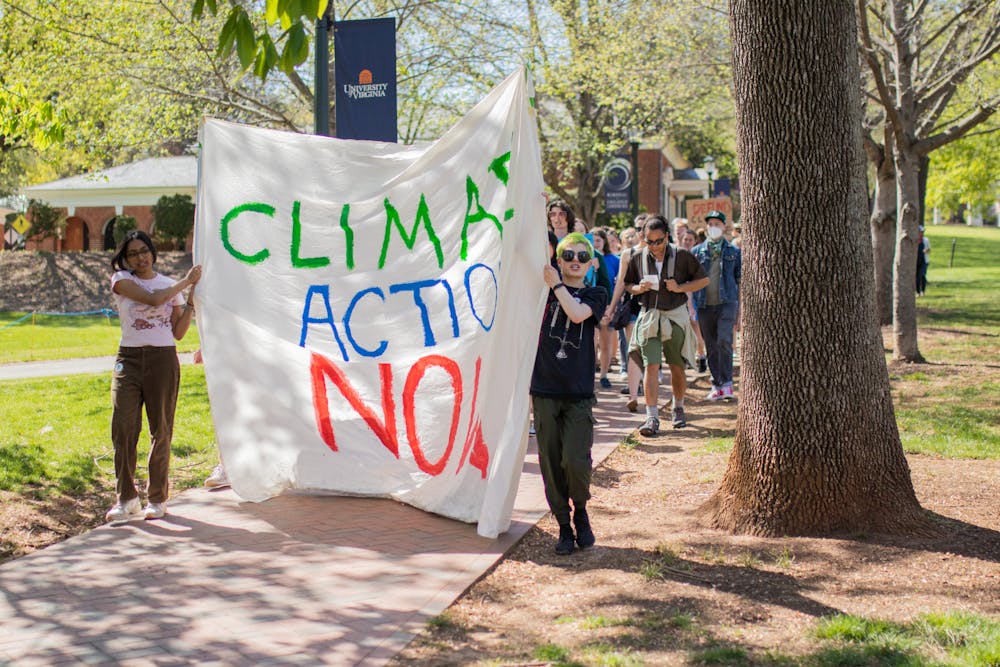New York University committed “to avoid any direct investments in any company whose primary business is the exploration or extraction of fossil fuels” in mid-September. NYU’s divestment from the fossil fuel industry follows almost two decades of effort by student organizers and activists to impel their school to recognize the ongoing and increasing threat of the climate crisis. NYU is not alone — over one hundred educational institutions in the United States, including Harvard, the University of Michigan, the University of California System and Cornell, have taken their investments out of fossil fuels. These commendable actions by peer institutions beg the question — what is the University waiting for?
As DivestUVA has pointed out before, it is no secret how much harm the fossil fuel industry causes. Fossil fuels account for over 75 percent of greenhouse gas emissions and nearly 90 percent of all carbon emissions. Globally, air pollution from fossil fuels causes 1 in 5 deaths. Fossil fuels are the greatest contributor to the worsening climate crisis, whose effects are apparent both worldwide and close to home. We know that the University understands this — their sustainability goals include being “fossil fuel free by 2030,” meaning our institution recognizes the dangers of fossil fuels. Despite this commitment, our University continues to invest in this abhorrent industry, making its commitment to environmentalism ring hollow.
The fact of the matter is, we cannot wait for 2030, especially when the University continues to move further away from its commitment to end its investments, not toward it. Every year that the University spends promising change and not delivering is another year in which our institution is contributing to the harm caused by fossil fuels.
The University is puzzlingly determined to cling to its remaining fossil fuel investments. Last Spring, the University Investment Management Company, which oversees the investment of the school’s $13.6 billion endowment, released an Investor Responsibility Framework outlining the principles to which fossil fuel companies must adhere to be considered for investment. These principles included the ludicrous and paradoxical principle that these fossil fuel companies must “safeguard the environment.” Despite how objectionable these principles are, though, the University fails to even follow them — it still makes direct investments in some of the largest, most profitable fossil fuel conglomerates that violate those same principles outlined by UVIMCO.
While we know that the University remains invested in the fossil fuel industry, it refuses to divulge specific information about its investments, such as names of the invested companies or amounts of direct and indirect investments. This lack of transparency not only raises concerns about accountability but also hinders the ability of concerned students, faculty and alumni to engage in constructive dialogue and advocate for responsible investment practices. It is imperative that the University discloses its financial ties to the fossil fuel industry if it wishes to earnestly address the concerns of its community and to uphold its purported commitment to environmental responsibility.
An earlier divestment movement on Grounds successfully lobbied the Board of Visitors in 1990 to remove over $14 million worth of stocks in companies operating in apartheid South Africa, which affected only a marginal percentage of its overall investments at the time. No one would argue that the urgency of this disassociation was contingent upon the volume of the University’s financial ties to that country — one dollar invested in an apartheid state is one dollar too many because the institution itself is intolerable. Though fossil fuels are a separate issue, the same logic applies — any degree of investment in the fossil fuel industry is unacceptable, no matter how much a company may promise to pollute the environment in a “sustainable manner.”
Still, the University maintains both direct and indirect investments in fossil fuels, despite the fact that full divestment would allow the University to stand alongside its peer institutions and demonstrate responsiveness to student desires. Moreover, divestment serves to fulfill the moral obligation to disaffiliate with an unquestionably harmful institution whose harms disproportionately affect low income and minoritized communities locally and globally.
The University has a moral, public and scientific imperative to divest completely from the fossil fuel industry. As more colleges and universities do the right thing, it only becomes increasingly shameful that the University has not followed suit. Years from now, we will look back on this moment and remark on the absurdity of this school’s inaction in the face of overwhelming data and precedent. Divest UVA calls on the University to listen to the specific demands of its students and to make good on its promises of environmental concern.
Divest UVA is a student-led coalition urging that the University extend its environmental commitments beyond operational sustainability to the University endowment.







